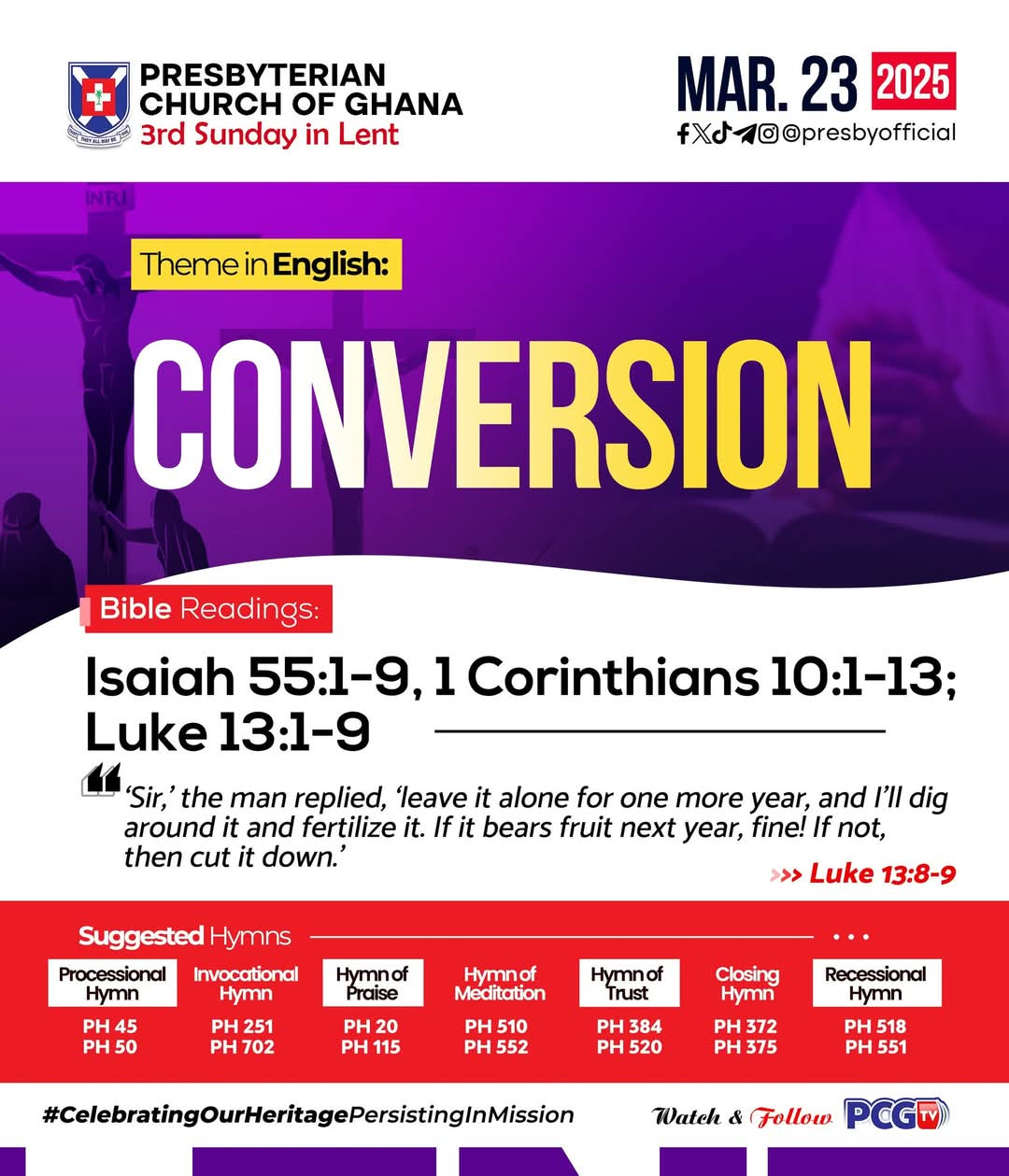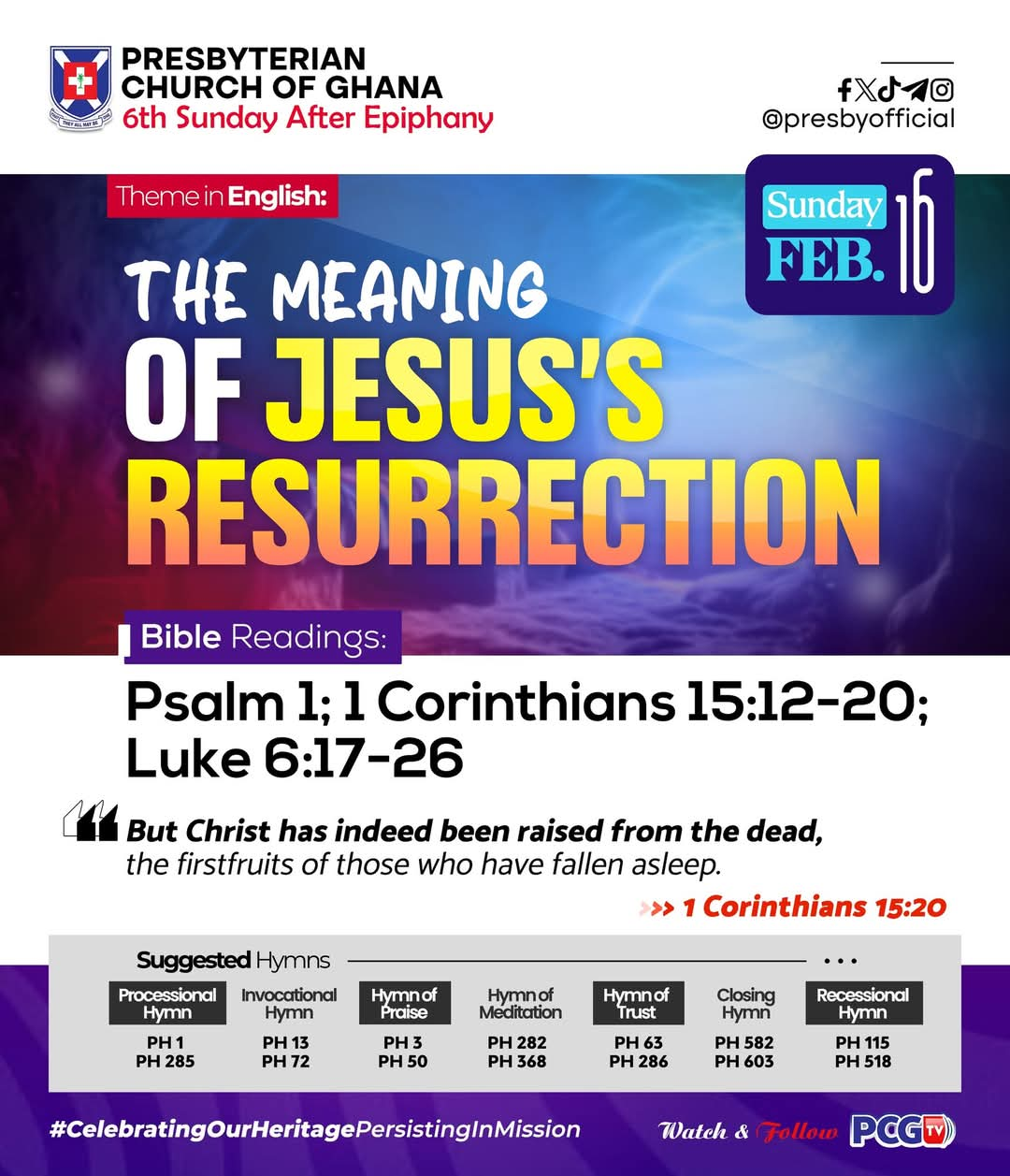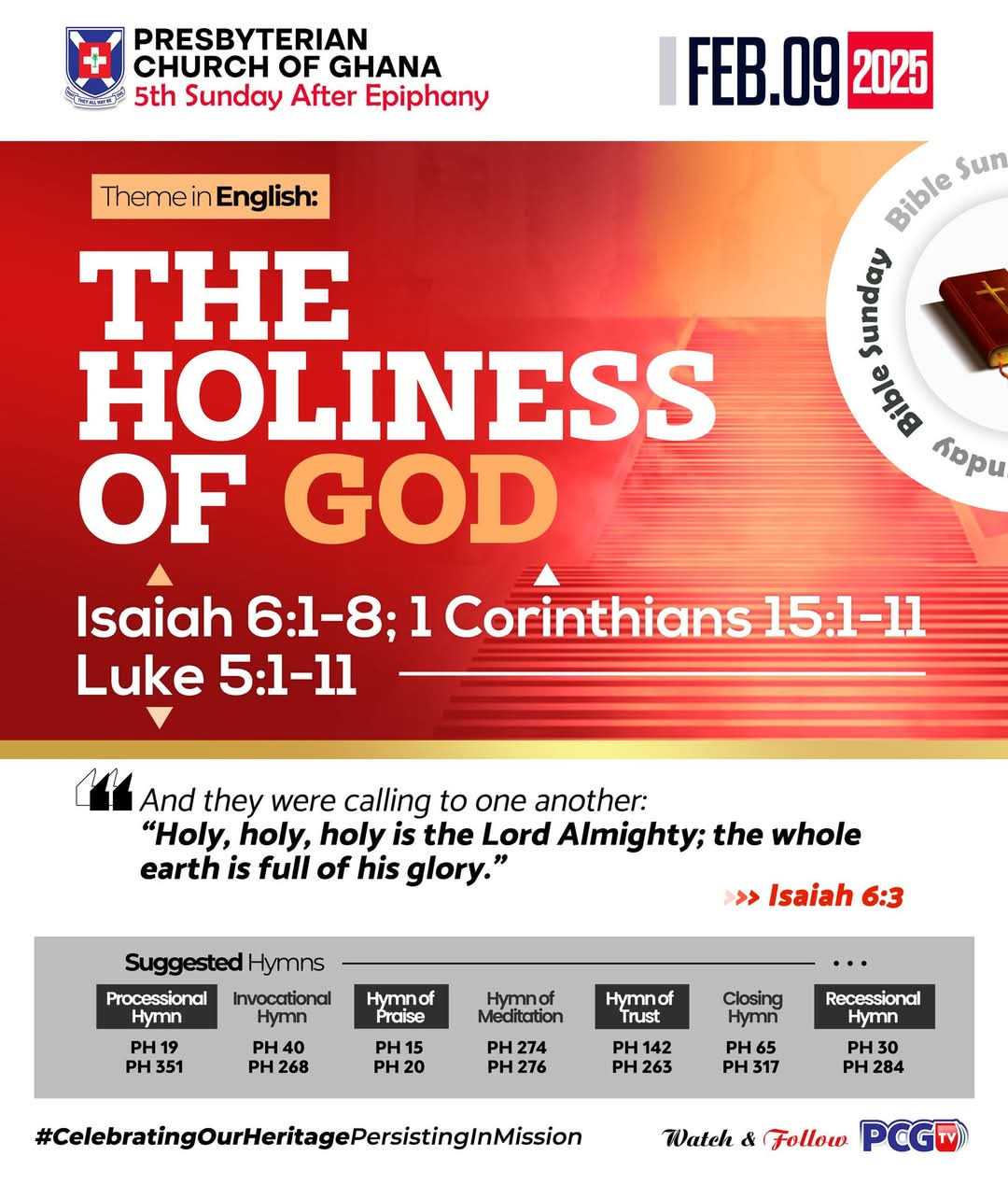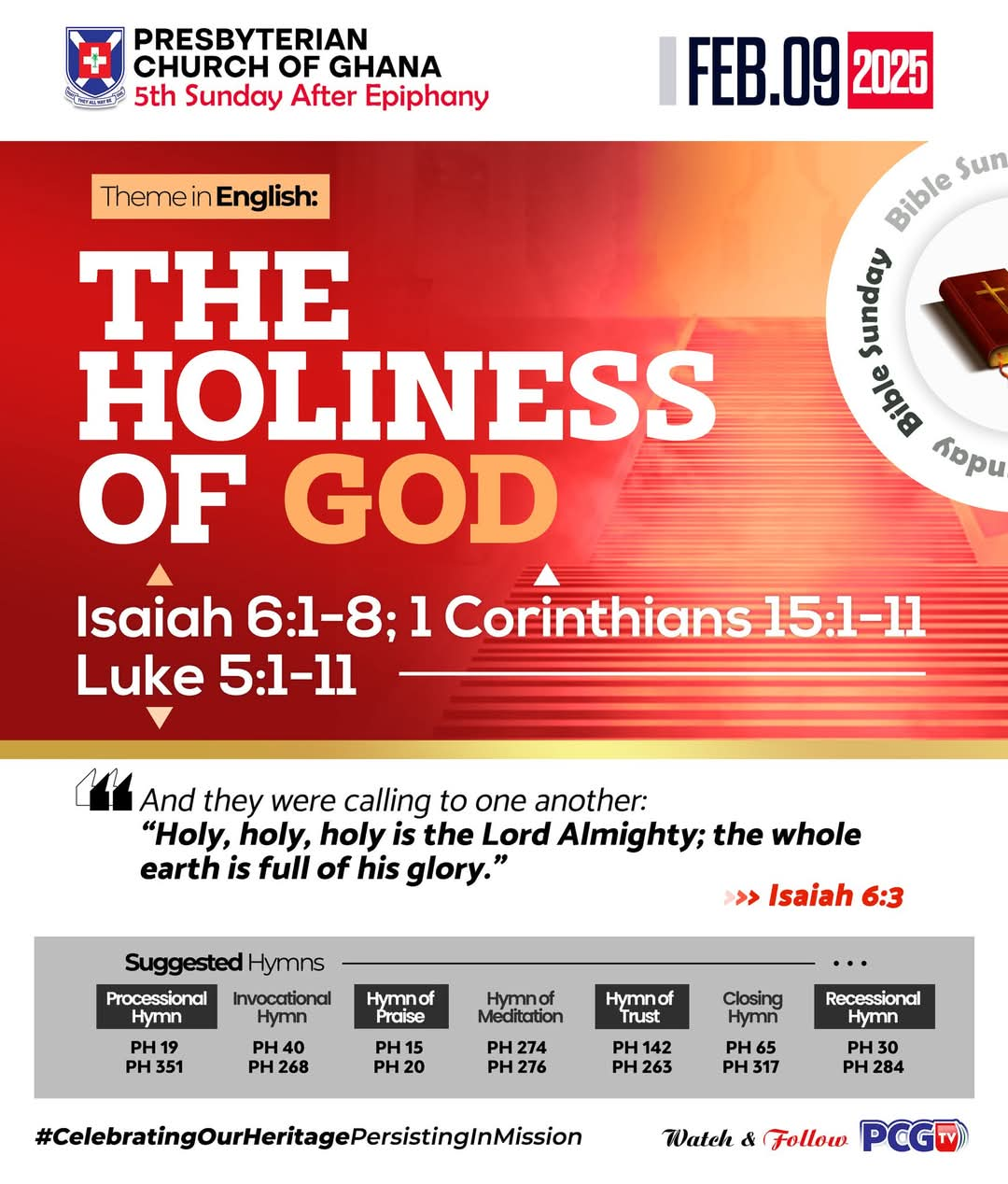
Sermon
Date: 30th March 2025
Occasion: 4th Sunday in Lent
Venue: PCG, LIVING BREAD
CONGREGATION, TANTRA HILL
Text: Psalm 32:2; 1 Corinthians 5:16-21; Luke 15:1-3, 11-32
![]()
A. INTRODUCTION
We have three passages before
us, all pointing to the central theme of Reconciliation. They
emphasize three key aspects:
1. An Example of the Process of
Reconciliation
(Luke 15:11-32)
2. The Privilege of Being Reconciled (Psalm 32:2)
3. The Acceptance and Assignment of
Reconciliation
(2 Corinthians 5:16-21)
Reconciliation is a journey
that starts with a decision, is fueled by desire, and requires drastic action.
The beauty of this message is that no matter how far we have gone, God
always welcomes us back. The challenge, however, is that we also need
to accept others just as God has accepted us.
Let’s reflect on how this
works in our daily lives.
B. REFLECTIONS FROM THE
FIRST READING (LUKE 15:11-32)
Jesus’ parable of the
Prodigal Son paints a vivid picture of our spiritual journey.
1. The Father Had Two
Prodigal Sons
Both sons, though different
in lifestyle, were lost in their own way:
·
Both
sons used the same approach when asking for something: "Give me"
(v.12, v.29)
·
Both
sons left the presence of the father: one physically, the other emotionally
(v.13, v.28)
·
Both
sons wanted the father’s property, not the father himself (v.12, v.28)
·
Both
sons followed evil: one through action, the other in his thoughts (v.13, v.30)
·
Both
sons abused the father’s generosity: one wasted it, the other rejected it
(v.14, v.31)
This means that we
can be lost even inside the church. Some people physically walk away
from God, while others stay in church but have hearts full of resentment and
judgment.
2. Reconciliation Begins
with a Decision
The younger son only realized
his mistake when he hit rock bottom.
·
The
pleasures he pursued turned into pain
·
His
high-class status was reduced to nothing
·
He
was starving and feeding pigs, something unacceptable for a
Jew
Lesson: Sin may look attractive, but it will
always leave you broken, empty, and ashamed. No one ever enters sin and
comes out the same.
3. Reconciliation Takes
Desire
The young man could have
stayed in self-pity, but he longed for his father’s house.
·
His
language changed from "Father, give me" (v.12) to "Father,
make me" (v.19)
·
He
walked back home, despite shame and fear
Lesson: It is not enough to know you are
lost. You must have the desire to return. Many people feel regret but never
take steps toward change.
4. Reconciliation Requires
Drastic Action
The father’s response was unusual
in Jewish culture:
·
He
ran to meet his son (showing urgency and love)
·
He
kissed him (showing acceptance)
·
He
gave him a robe (restoring identity)
·
He
gave him a ring (restoring economic status)
·
He
gave him shoes (elevating his position)
·
He
organized a feast (restoring his social standing)
Lesson: When God forgives, He does not do it
halfway. He restores us completely!
C. REFLECTIONS ON THE
SECOND READING (PSALM 32:2)
Reconciliation with God
brings privileges:
1. Divine Protection (v.6-7) – God becomes our refuge
2. Divine Preservation (v.7) – He keeps us through trials
3. Divine Proximity (v.8-9) – He gives guidance
4. Divine Peace (v.10) – Walking with God brings joy
5. Divine Praise (v.11) – We gain a testimony of
deliverance
Lesson: When we are reconciled with God, we
are covered on all sides.
D. REFLECTIONS ON THE
THIRD READING (2 CORINTHIANS 5:16-21)
This is where the challenge
comes in.
1. Living as Proof of
Reconciliation
After being reconciled with
God, you must show it in your life. God does not remove you from the
world, but sends you to be a testimony:
·
First
to Jerusalem (your immediate circle)
·
Then
to Judea (your community)
·
Then
to Samaria (those different from you)
·
Finally
to the world (Acts 1:8)
2. Proving the Old is Gone
It is not enough to say "I
have changed." You must prove it.
·
People
around you will not trust you immediately
·
You
will face judgment and skepticism
·
You
must remain faithful despite opposition
3. Making Reconciliation
Possible for Others
Many times, we make
it difficult for others to reconcile with God.
·
We
judge people by appearance, past sins, or status
·
We
make strict rules about what they must do before they are
"accepted"
The father in the parable did
not wait for his son to clean up before welcoming him. Let’s
not put unnecessary obstacles before people who are trying to find God.
4. Living as Ambassadors
of Reconciliation
Paul says we are
Christ’s ambassadors (v.20).
·
An
ambassador carries the message of their home country
·
Our
message is one of love, grace, and acceptance
·
How
we live must reflect our identity as representatives of Christ
Lesson: We are not just saved for ourselves
but are called to lead others to Christ.
E. PRACTICAL APPLICATION:
MAKING RECONCILIATION EASY
1. For Those Who Need to Be Reconciled:
o Come back to God; He is waiting for
you
o No sin is too great for God to forgive
o Do not let fear or shame keep you from
returning
2. For Those Who Have Been Reconciled:
o Live in a way that proves you have
changed
o Accept yourself as a new creation
o Be patient as you earn the trust of
others
3. For Those Who Need to Accept Others:
o Stop putting unnecessary burdens on
people
o Welcome people before they
change, just as God welcomes them
o Make the church a place of grace, not
judgment
F. CONCLUSION
Reconciliation is God’s
greatest gift to us. It starts with a decision, is fueled by desire,
and requires drastic action. But the real test is not just accepting
reconciliation—it is helping others receive it too.
God has called us not
just to be reconciled but to be agents of reconciliation. The world is
broken, and people are waiting for someone to show them the way back to God.
Will you be that person?
May the Lord give us the
grace to live as true ambassadors of reconciliation. Amen!








